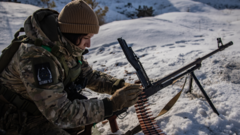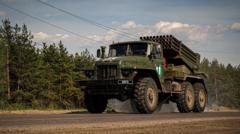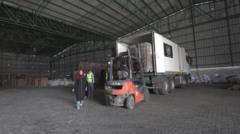The DR Congo and Rwanda aim to create a peace deal by May 2, amidst a backdrop of unrest and displacement due to rebel activity in eastern Congo.
Peace Progress: DR Congo and Rwanda Commit to Joint Resolution

Peace Progress: DR Congo and Rwanda Commit to Joint Resolution
Diplomatic meeting in Washington aims for a new peace plan amid ongoing conflict
This week, the foreign ministers of the Democratic Republic of Congo and Rwanda signed a pivotal agreement in Washington, indicating a commitment to respect each other's sovereignty and establish a draft peace plan by May 2. The agreement was inked in the presence of U.S. Secretary of State Marco Rubio, highlighting international interest in resolving the long-standing tensions between the two nations.
The recent months have seen a troubling surge in violence as Rwanda-backed M23 rebels captured significant areas in the mineral-rich eastern DR Congo, displacing hundreds of thousands of civilians. In response to increasing territorial losses, the Kinshasa government sought assistance from the U.S., offering access to the country's mineral resources in exchange for support.
Currently, the M23 rebels are in control of major urban centers such as Goma and Bukavu, raising concerns about a possible regional conflict. The agreement reached in Washington stands out as a sign of progress given the historically strained relations between the two countries, with both parties now expressing optimism for substantial investments facilitated by U.S. involvement.
Despite the positive diplomatic gestures, reports suggest that skirmishes continued on Friday in North Kivu province. Earlier in the week, officials from both DR Congo and the M23 group pledged their commitment to peace and a potential permanent ceasefire. However, the ongoing violence has taken a toll, with estimates of 7,000 fatalities in eastern DR Congo since the beginning of the year alone.
The crisis is exacerbated by accusations from the DR Congo that Rwanda is supplying arms and troops to the M23, a claim that Rwanda has consistently denied, despite confirmations from both UN and U.S. sources. As hostilities persist, the international community watches closely to see if the latest diplomatic efforts will lead to a lasting resolution of the conflict.
The recent months have seen a troubling surge in violence as Rwanda-backed M23 rebels captured significant areas in the mineral-rich eastern DR Congo, displacing hundreds of thousands of civilians. In response to increasing territorial losses, the Kinshasa government sought assistance from the U.S., offering access to the country's mineral resources in exchange for support.
Currently, the M23 rebels are in control of major urban centers such as Goma and Bukavu, raising concerns about a possible regional conflict. The agreement reached in Washington stands out as a sign of progress given the historically strained relations between the two countries, with both parties now expressing optimism for substantial investments facilitated by U.S. involvement.
Despite the positive diplomatic gestures, reports suggest that skirmishes continued on Friday in North Kivu province. Earlier in the week, officials from both DR Congo and the M23 group pledged their commitment to peace and a potential permanent ceasefire. However, the ongoing violence has taken a toll, with estimates of 7,000 fatalities in eastern DR Congo since the beginning of the year alone.
The crisis is exacerbated by accusations from the DR Congo that Rwanda is supplying arms and troops to the M23, a claim that Rwanda has consistently denied, despite confirmations from both UN and U.S. sources. As hostilities persist, the international community watches closely to see if the latest diplomatic efforts will lead to a lasting resolution of the conflict.















